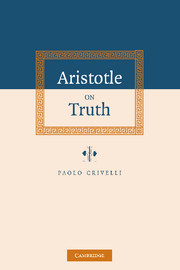Book contents
- Frontmatter
- Contents
- Acknowledgements
- Notes on the text
- List of abbreviations of titles of Aristotle's works
- Introduction
- Part I BEARERS OF TRUTH OR FALSEHOOD
- Chapter 1 States of affairs, thoughts, and sentences
- Chapter 2 Truth conditions for predicative assertions
- Chapter 3 Truth conditions for existential assertions
- Part II ‘EMPTY’ TERMS
- Part III TRUTH AND TIME
- Appendix 1 Metaph. Θ 10, 1051b1: the text
- Appendix 2 Metaph. Θ 10, 1051b2–3: the text
- Appendix 3 Int. 7, 17b16–18: the text
- Appendix 4 The two-place relations in Aristotle's definition of truth
- Appendix 5 Aristotle's theory of truth for predicative assertions: formal presentation
- Appendix 6 The failure of bivalence for future-tense assertions: formal presentation
- References
- Index of names
- Index of subjects
- Index of passages
Chapter 1 - States of affairs, thoughts, and sentences
Published online by Cambridge University Press: 22 September 2009
- Frontmatter
- Contents
- Acknowledgements
- Notes on the text
- List of abbreviations of titles of Aristotle's works
- Introduction
- Part I BEARERS OF TRUTH OR FALSEHOOD
- Chapter 1 States of affairs, thoughts, and sentences
- Chapter 2 Truth conditions for predicative assertions
- Chapter 3 Truth conditions for existential assertions
- Part II ‘EMPTY’ TERMS
- Part III TRUTH AND TIME
- Appendix 1 Metaph. Θ 10, 1051b1: the text
- Appendix 2 Metaph. Θ 10, 1051b2–3: the text
- Appendix 3 Int. 7, 17b16–18: the text
- Appendix 4 The two-place relations in Aristotle's definition of truth
- Appendix 5 Aristotle's theory of truth for predicative assertions: formal presentation
- Appendix 6 The failure of bivalence for future-tense assertions: formal presentation
- References
- Index of names
- Index of subjects
- Index of passages
Summary
In his commentary on Aristotle's de Interpretatione Ammonius asks ‘among which of the things that are in any way one should look for truth and falsehood’ (17, 29–30). In Aristotle's works there is no formulation of this or of an equivalent question. So, there is a case for doubting that Aristotle ever addressed the problem of what items are bearers of truth or falsehood. However, even if Aristotle never addressed this problem, it is still worthwhile considering what the items are which Aristotle does in fact speak of as true or false. For this result will provide a useful indication for determining what solution Aristotle would have offered for the problem of what items are bearers of truth or falsehood, had he addressed it.
Aristotle applies the word ‘true’ (‘ἀληθής’) and its cognates to items of three main kinds: objects (which include states of affairs), mental items (states or acts of believing, knowing, grasping by means of the intellect, perceiving, imagining, etc.), and linguistic items (sentences).
Section 1 of this chapter focuses on objects, in particular on states of affairs. I examine two passages from the Metaphysics. The first, which constitutes the beginning of Δ 29, is the most unequivocal testimony of Aristotle's commitment to states of affairs (I devote some arguments to showing that it is really states of affairs Aristotle is concerned with). The second Metaphysics passage is the first part of Θ 10. Aristotle describes states of affairs as being true or false in the strictest, i.e. most fundamental, sense because their truth and falsehood is appealed to in explaining the truth and falsehood of items of other types: an affirmative predicative belief or sentence is true (false) when and only when the state of affairs it concerns is true (false), while a negative predicative belief or sentence is true (false) when and only when the state of affairs it concerns is false (true).
- Type
- Chapter
- Information
- Aristotle on Truth , pp. 45 - 76Publisher: Cambridge University PressPrint publication year: 2004



